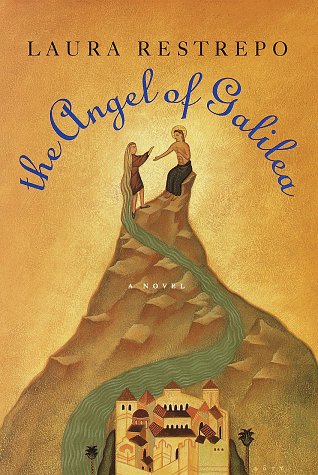12 Dec / The Angel of Galilea by Laura Restrepo, translated by Dolores Koch

 A magazine reporter, referred to as “La Monita, Blondie” – because of her “mass of blond hair” thanks to her Belgian grandfather – is sent to cover an angel sighting in the Bogotá barrio of Galilea. Off she goes, first to the local church where the priest denies the existence of any celestial members in his parish. But she’s tenacious, and thanks to the helpful villagers, she soon enough meets the angel. Monita quickly decides she’s madly in love, and is then conveniently prepared by the locals to … uhm … get intimate with the celestial being. Post-union, she attempts to figure out her young lover’s holy status. She conveniently consults a psychologist friend (herself rather angel-like), who offers more plausible explanations for the angel’s behavior. So … to believe or not to believe …?
A magazine reporter, referred to as “La Monita, Blondie” – because of her “mass of blond hair” thanks to her Belgian grandfather – is sent to cover an angel sighting in the Bogotá barrio of Galilea. Off she goes, first to the local church where the priest denies the existence of any celestial members in his parish. But she’s tenacious, and thanks to the helpful villagers, she soon enough meets the angel. Monita quickly decides she’s madly in love, and is then conveniently prepared by the locals to … uhm … get intimate with the celestial being. Post-union, she attempts to figure out her young lover’s holy status. She conveniently consults a psychologist friend (herself rather angel-like), who offers more plausible explanations for the angel’s behavior. So … to believe or not to believe …?
As books go, Angel is sly, wavering between skewering satire and fervent religious devotion. Monita arrives at her tabloid office dreading having to cover another beauty pageant. Her unexpected other-worldly assignment is met with initial mocking doubt: “… it was now our turn, here in Colombia. We pick up what is already passé in Miami. Astonishing, isn’t it, that we journalists spend most of our time warming up topics already cold in the United States.” But she won’t complain about getting to skip the latest crop of “wasp waists and wasp-size brains to match.”
While Mona’s cynicism dominates, also woven into the searching narrative are italicized excerpts from the journals written by the angel’s mother, filled with the holy musings allegedly dictated by her mute son. The mother’s consuming belief in his miraculous return (after being sold as an infant by her own unforgiving father) is treated with near reverence by author Restrepo; as blasphemous as some of the contents might be against strict Christian dogma, the journals are not tinged with the same sarcasm that runs throughout the rest of the story. In essence, the journals remain sacred text.
The stories about the angel – as the angel ironically remains mute throughout, he cannot clarify or deny a single fact – are anything but sacred, as they continue to be challenged and deconstructed by a myriad of memorable characters. The culinary Muñís sisters – Chofa who speaks, Rufa who doesn’t – who “know everything, see everything going on” gladly reveal the angel’s history to Monita, complete with foreign adoptions, drug abuse, and even a mysterious prison break. In spite of tall-tale details, theirs just might be the more trustworthy source of the angel’s origins …
Restrepo takes every opportunity to question how belief and trust can form in such unconcrete arenas of religion, power, even parenting … as well as storytelling. Amidst her uneven mixture of reverence and cynicism, Monita (as well as the readers) must ultimately claim her (our) own individual version of acceptable truth, somewhere in between the extremes of religion and dogma, and the solidity of rationale and logic.
Readers: Adult
Published: 1998 (United States)
